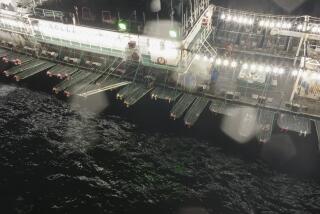Capitalism Depresses East German Port : Unification: Unemployed workers in once-bustling Rostock are disturbed by side effects of switch to a free market.
- Share via
ROSTOCK, East Germany — Skipper Gerhard Hein pointed to the idle ships anchored along the desolate wharf.
“They already sold my ship. There is no market for all the fish we catch,” he said.
Hein, like many of his fellow sailors in East Germany’s Baltic coast port of Rostock, is worried about his future and that of the fishing industry.
“In a year, all this will be gone,” he said, making a sweeping gesture that encompassed the fishery, shipyards and ships around him.
Until recently, the northern city of Rostock was bustling with activity. More than 55,000 people were employed at the shipyards. The port served as a major transit center for goods to and from the Soviet Union and Eastern Europe. Every day fishing vessels unloaded their catch at the packing plant.
Now, about half the shipyard employees are likely to lose their jobs. The docking bays are depressingly silent. The port does not even smell of fish.
“What can we do? I guess this is the price we have to pay for unification,” said Hein, 54.
Like other East Germans, Hein admits he is puzzled by the side effects that came with the introduction of a free market economy.
On July 1, after four decades of socialist economy, East Germany plunged headlong into capitalism, adopting West Germany’s currency and economic system, lifting subsidies and allowing free competition.
Some economists say that in the long run, this first step to full unification will lead to a second economic miracle.
Right now, East Germany is beset by soaring unemployment, sinking productivity and a widespread sense of confusion.
East Germans have shown a marked preference for imported products that flood the markets, scorning “made in East Germany” labels.
Farmers have had to dump record harvests because they could not find buyers for their produce.
Every week about 25,000 East Germans lose their jobs. One million more are confined to short-time work, which often means they are still employed but have no work to do.
Entire industrial sectors, like the Rostock deep-sea fishery and shipyards, risk being wiped out because no investors can be found to buy them, or at least prop them up.
The 8,000 former state-owned companies are struggling to survive and have started massive lay-off programs.
A few days ago, when Erhard Gonsior turned up for work at the Rostock fishery, as he had done for 35 years, he was not really surprised to find he had lost his job.
“It happens to so many, I think everybody more or less expects it,” the 53-year-old engineer said.
Since July, the former fishing cooperative has been divided into four incorporated companies under a holding. More than one-third of the employees lost their jobs in the process.
But Rostock residents say many of the old supervisors, installed by the hard-line communist government ousted last fall, smoothly slipped back into managerial positions.
“The old guard is still sitting on the upper floors,” said engineer Dieter Stichert. “Nothing will change here unless they leave. But there is nobody to fire them, nobody is in charge, everything is chaotic.”
One sign of communism still dominates the port--a larger-than-life statue of a sailor bearing the words, “Everything for the well-being of the people--for our socialist home.”
Stichert, 43, who says he votes conservative, wants to seek a new life in the West German port city of Kiel.
For those who remain, the future looks bleak.
Most of the shipyard workers who are still employed are confined to short-time work. Many fishing crews have been cut down by one third, to 65.
Only 12 of the deep-sea fishing fleet of 36 vessels went out to sea this summer.
“Usually you wouldn’t see a ship here at this time of year,” said Karl-Heinz Kind, captain of the Ludwig Turek, which has been anchored for months in Rostock.
“We expect the fleet will have to be reduced by at least 10 ships,” Kind said. “Our ships are just not efficient enough, we cannot compete, we were never linked to world trade.”
The fishery and the shipyards make up more than 60% of Rostock’s industry. The city, population 250,000, is about 160 miles from Berlin, in the depressed north of the country.
“Entire families are working in the fishery and shipyards,” said Kind, 36, who started out as a sailor at the age of 16.
“When we grew up we always had someone telling us what to do,” said Mayor Wolfgang Zoellick, referring to the iron-fisted communist rule.
“Things are already changing and it will get better after unification,” he said. “We have to go through this. We have to hope for an optimistic Christmas.”
More to Read
Sign up for Essential California
The most important California stories and recommendations in your inbox every morning.
You may occasionally receive promotional content from the Los Angeles Times.













